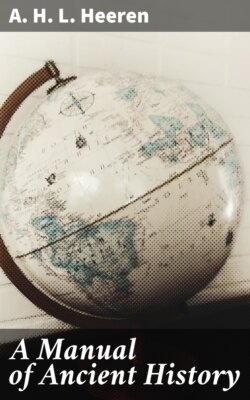Читать книгу A Manual of Ancient History - A. H. L. Heeren - Страница 29
На сайте Литреса книга снята с продажи.
History of the Persian Empire, from BC 560—330.
ОглавлениеTable of Contents
Sources. Preservation of historic records among the Persians themselves under the form of royal annals; origin and nature of those annals. As these have been destroyed, we are obliged to deduce the history from foreign writers, some of whom, however, availed themselves of the Persian annals. 1. Greeks: their authority as writers, contemporary, but not always sufficiently acquainted with the east. (a) Ctesias. His court history compiled from Persian annals, would be the principal work did we possess the whole; we have, however, only an extract from it preserved by Photius. (b) Herodotus: who probably availed himself of similar sources in some portion of his work. (c) Xenophon. To this period of history belong, not only his Anabasis and Hellenica, but also his Cyropædia, or portraiture of a happy empire and an accomplished ruler, according to eastern ideas, exhibited in the example of Cyrus: of use so far as pure historic records are interwoven with the narrative. (d) Diodorus, etc. 2. Jewish writers. The books of Esdras and Nehemiah; and more particularly that of Esther, as containing a faithful representation of the Persian court and its manners. 3. The accounts of the later Persian chroniclers, Mirkhond in particular, who flourished in the thirteenth century of the christian era, can have no weight in the scale of criticism; they are nevertheless interesting, inasmuch as they make us acquainted with the ideas that the inhabitants of the east form of their early history.
The modern authors on Persian history are principally those who have written on ancient history in general: see p. 2. A treatise on Persian history, deduced from eastern sources, will be found in the Ancient Universal History, vol. iv.
Brissonius, de Regno Persarum, 1591, 8vo. A very laborious compilation.
The section concerning the Persians in † Heeren, Ideas, etc. vol. i, part 1.
[Malcolm, Sir John, History of Persia, from the earliest ages to the present times. Lond. 1816, 4to. 2 vols. "A valuable work."]
Original condition of the Persians.
1. State of the Persian nation previous to Cyrus; a highland people, subject to the Medes, dwelling in the mountainous parts of the province of Persis, and leading wholly, or for the most part, a nomad life. Division into ten clans, among which that of the Pasargadæ, the noblest The horde of the Pasargadæ, and ruling horde, is particularly remarkable on account of the figure it makes in subsequent history.—The result of this division was a patriarchal government, the vestiges of which remain visible in the whole of the following history of the Persians. Permanent distinction between the tribes in reference to their mode of life, observable even during the most flourishing period of the Persian state: three of the nobles or warriors, three of the husbandmen, and four of the shepherds. Argument thence deduced, that the history of the has the ascendant. Persians as a dominant nation, is that of the nobler clans alone, and of the Pasargadæ more especially.
Cyrus, similar to Gengis-khan and other Asiatic conquerors;
2. The personal history of Cyrus, the founder of the Persian monarchy, was, even in the time of Herodotus, so obscured under the veil of romance, that it was no longer possible to detect the real truth. It is, however, evident, that the course of the revolution wrought by him was, on the whole, the same as was followed in all similar empires founded in Asia. Gengis-khan, in a later age, was placed at the head of all the Mogol hordes; in the same manner was Cyrus elected chief of all the Persian tribes, by whose assistance he founds the Persian empire about BC 561. became a mighty conqueror, at the time that the Babylonian and Median kingdoms of Inner Asia were on the decline, and before the Lydian empire, under Crœsus, had been firmly established.
Descent of Cyrus from the family of Achæmenes, (Jamshid?). That family belonged to the Pasargadæ tribe, and therefore remained the ruling house.
Of the Medo-Bactrian empire, destroyed 561.
of the Lydian empire:
Asiatic Greeks subjected, about 557
of Babylon, 538.
Cyrus is slain in battle with the Massagetæ, 529.
3. Rise of the Persian dominion, in consequence of the overthrow of the Medo-Bactrian empire, after the defeat of Astyages at Pasargada. Rapid extension by further conquest. Subjection of Asia Minor after the victory won by Cyrus in person over Crœsus, and capture of the Greek colonies by the generals of the Persian monarch. Conquest of Babylon and all the Babylonian provinces. The Phœnician cities submit themselves of their own accord. Even in Cyrus's time, therefore, the frontiers of the Persian empire had been extended in southern Asia to the Mediterranean, to the Oxus, and to the Indus; but the campaign against the nomad races, inhabiting the steppes of Central Asia, was unsuccessful; and Cyrus himself fell in the contest.
